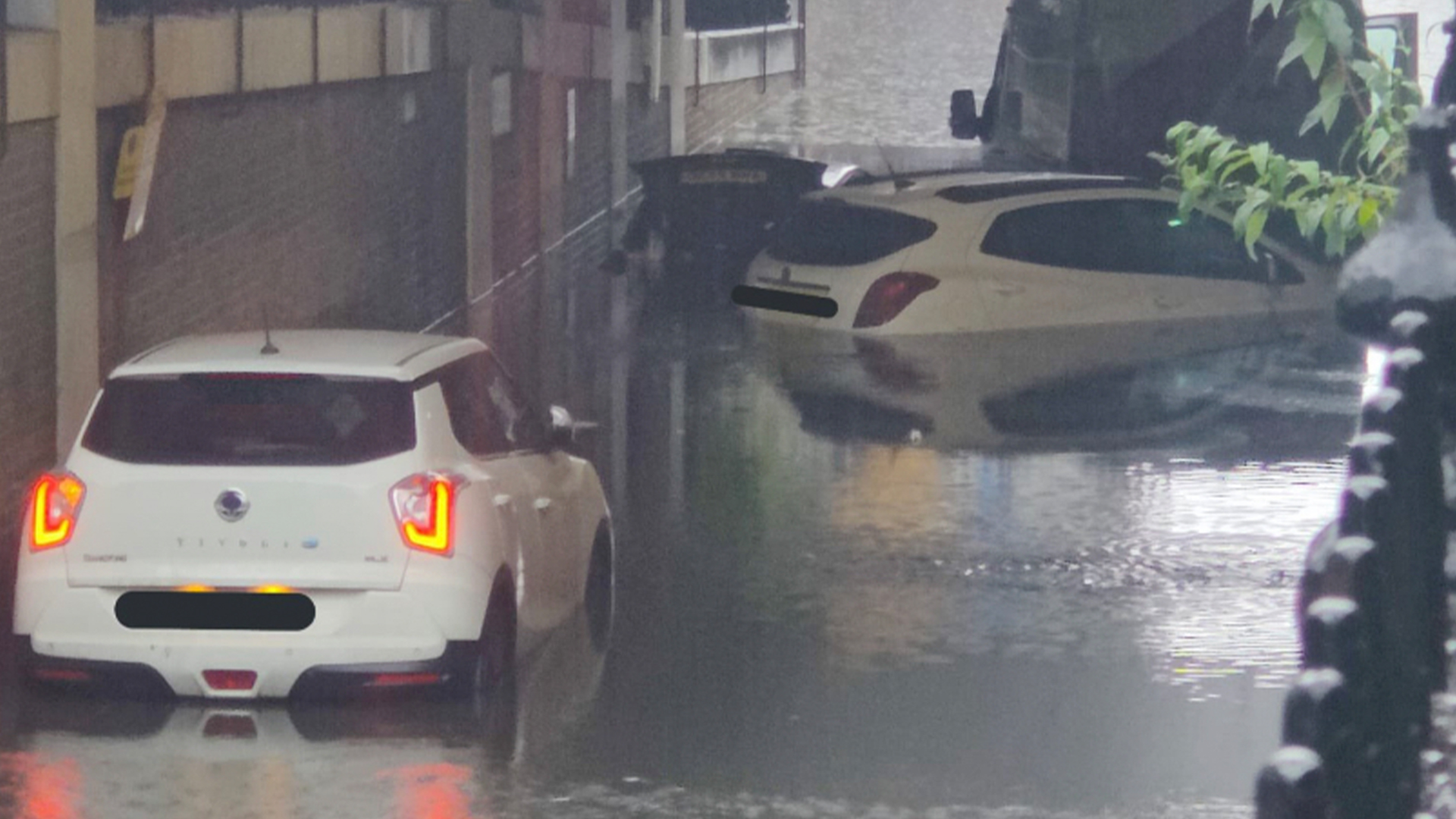Whipps Cross Hospital patients evacuated after flooding
- Published
- comments
London flooding: What happened when a month of rain fell in one go
A hospital has been forced to evacuate patients and cancel operations after heavy rainfall caused it to lose power.
Around 100 inpatients at Whipps Cross Hospital in east London have been moved elsewhere and ambulances diverted after the NHS declared a "major incident".
Newham Hospital's A&E department had also urged people to seek urgent medical care elsewhere.
London Fire Brigade (LFB) said it had taken more than 1,000 flooding-related calls across London.
LFB said it had rescued people trapped in cars and also helped with flooded basements and collapsed ceilings.
The Met Office has issued further warnings over rain and thunderstorms in England and Scotland over the next four days.
A yellow warning has been issued, external for parts of Kent and Sussex on Monday.
Ceiling panels on the maternity ward at Whipps Cross Hospital collapsed as another block was left without power.
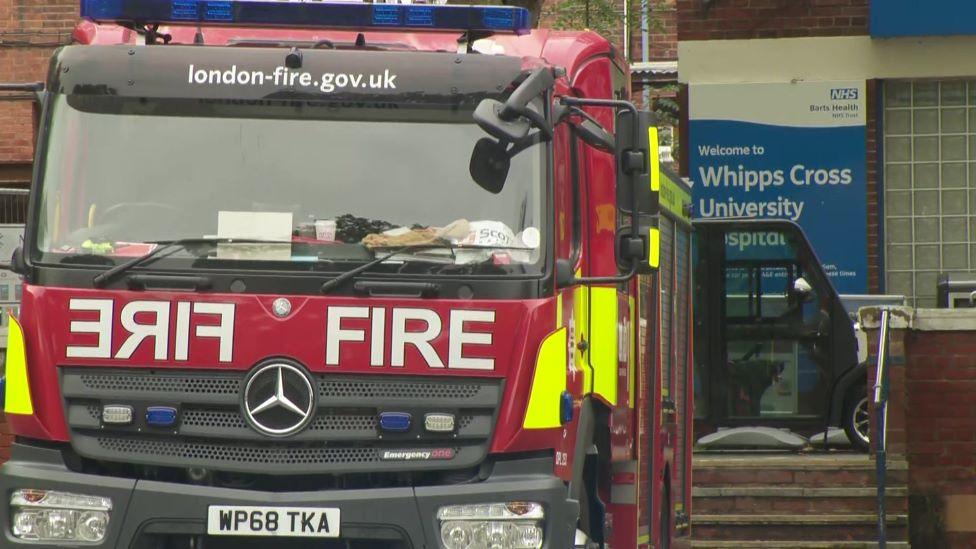
Ambulances are being diverted from Whipps Cross Hospital as the London Fire Brigade helps deal with flooding
A spokesperson for Barts Health NHS Trust said the situation was being kept "under constant review" after cancelling all planned surgery and outpatient appointments until Thursday.
They added: "We are diverting ambulances while we work hard to clean up affected areas of the hospital.
"The emergency department at the hospital remains open for walk-ins but patients requiring urgent treatment are asked to attend alternative hospitals where possible.
"We are working hard to clean up affected areas."
Allow X content?
This article contains content provided by X. We ask for your permission before anything is loaded, as they may be using cookies and other technologies. You may want to read X’s cookie policy, external and privacy policy, external before accepting. To view this content choose ‘accept and continue’.
Newham Hospital is now fully operational after also being affected by flooding.
Stepney Green station was the last of nine Tube and London Overground stations closed due to flooding to reopen on Monday.
St James's Park in London saw 41.6mm (1.6in) of rain on Sunday, making it the wettest part of the country.
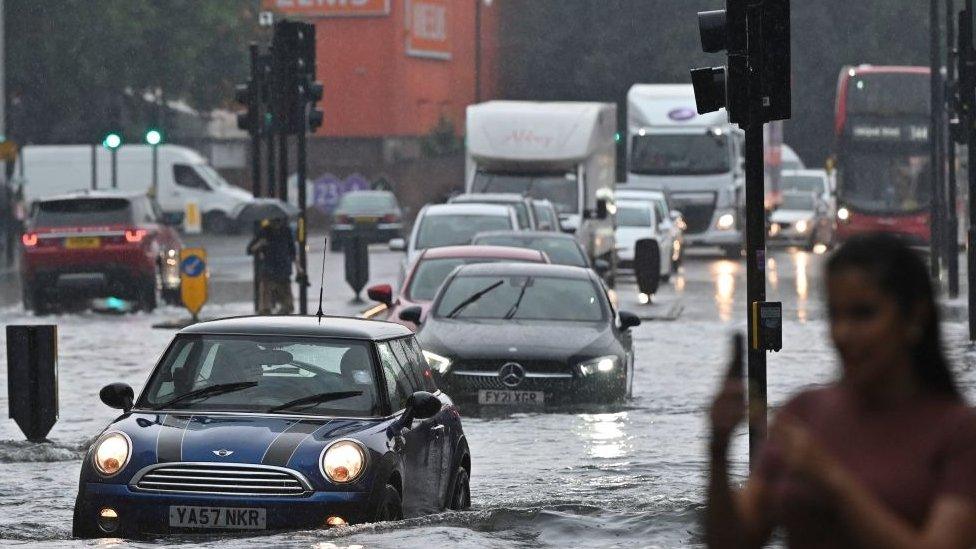
Buses and cars were left stranded when roads across London flooded on Sunday
Barking in east London reported 41.3mm on Sunday, most of which fell between 15:00 and 17:00 BST.
This has been the second 40mm rainfall event in London this month.
Many of the capital's roads closed due to the flooding, including the Blackwall Tunnel, the A12 and parts of the North Circular.
Standon Calling festival in Hertfordshire was abandoned due to Sunday's flooding.
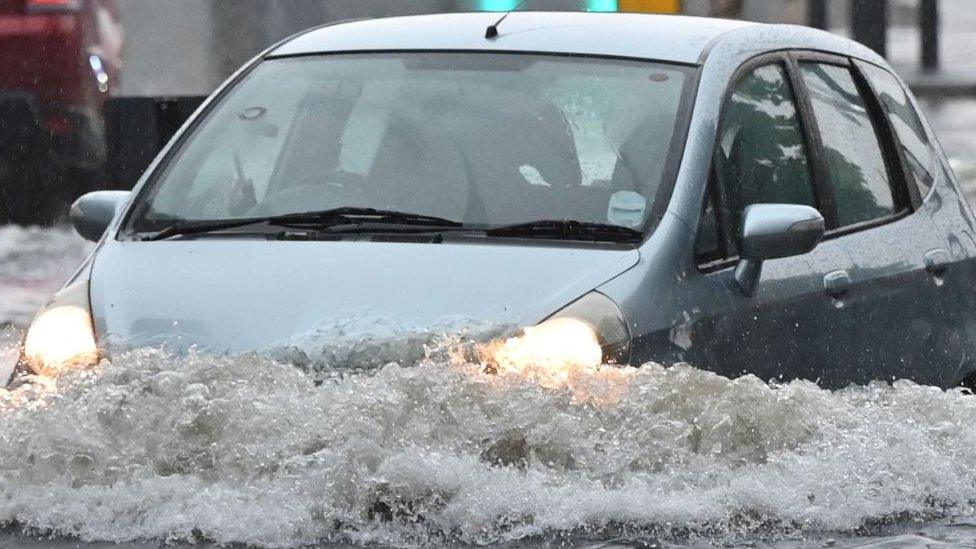
The London Fire Brigade said people had to be rescued from trapped cars
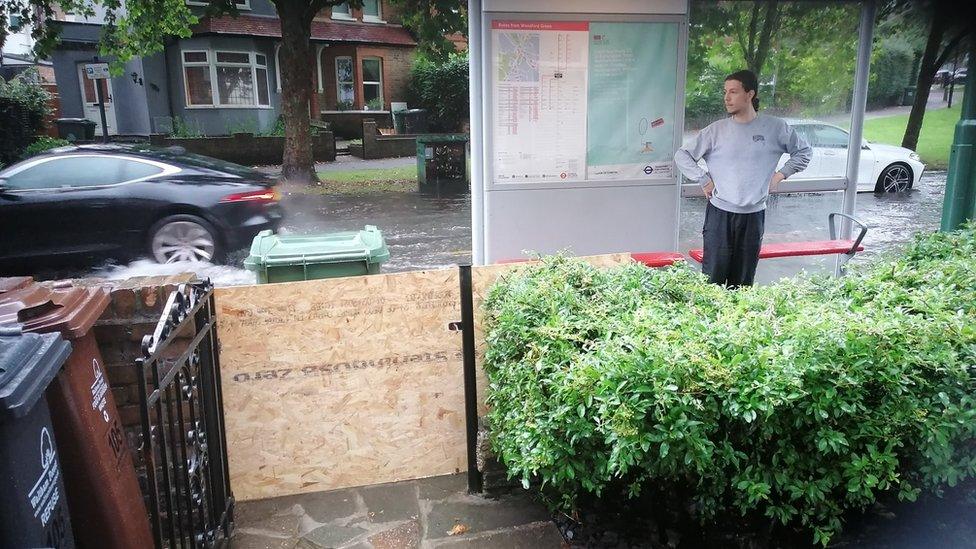
Residents in Woodford created a makeshift flood defence
One flood warning, external for the Isle of Wight, and a further 10 less severe flood alerts have also been issued, covering most of the capital and parts of surrounding counties.
A yellow storm warning has also been issued for Tuesday and Wednesday for much of the Midlands and northern England.
Across most of Scotland a yellow thunderstorm warning has been put in place from noon on Tuesday with heavy rain expected until Thursday morning.
Were you affected by floods? Share your experience by emailing haveyoursay@bbc.co.uk, external.
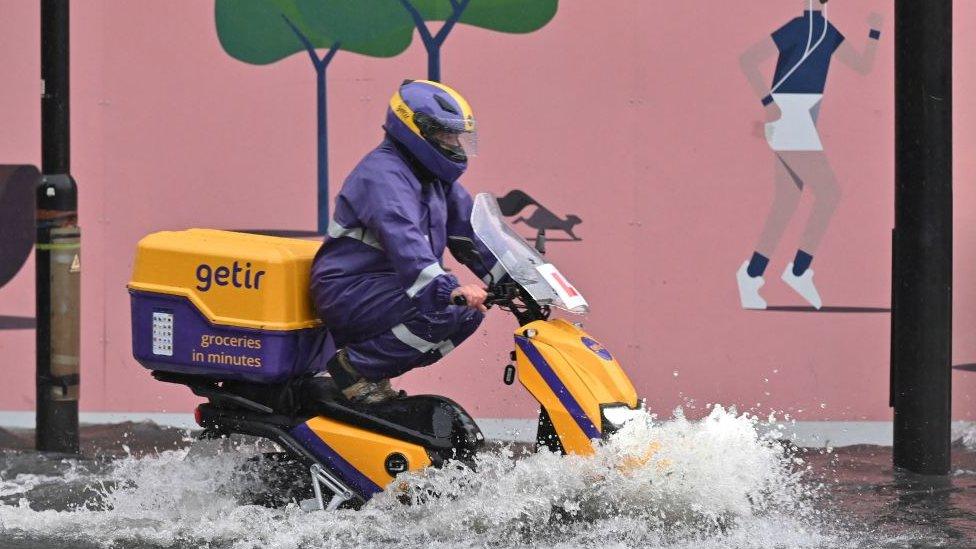
A motorcyclist drives through deep water on a flooded road in The Nine Elms district of London
One woman described her "heartbreak" as flood water ruined her parents home in Walthamstow.
Nicola Thorogood, 33, said her family tried to prevent water coming into the house but eventually had to give up and attempt to salvage as many belongings as possible.
She said her parents had "worked so hard all their life to have that house and it's the thing they're most proud of and want to pass on to us eventually".
"It's that that breaks my heart," she said. "We took what we could upstairs, obviously anything like sentimental photos and things like that.
"Then we retreated upstairs to my parents' room and just watched the rain fall and the flood come in."

Analysis
By Tom Edwards, BBC London Environment Correspondent
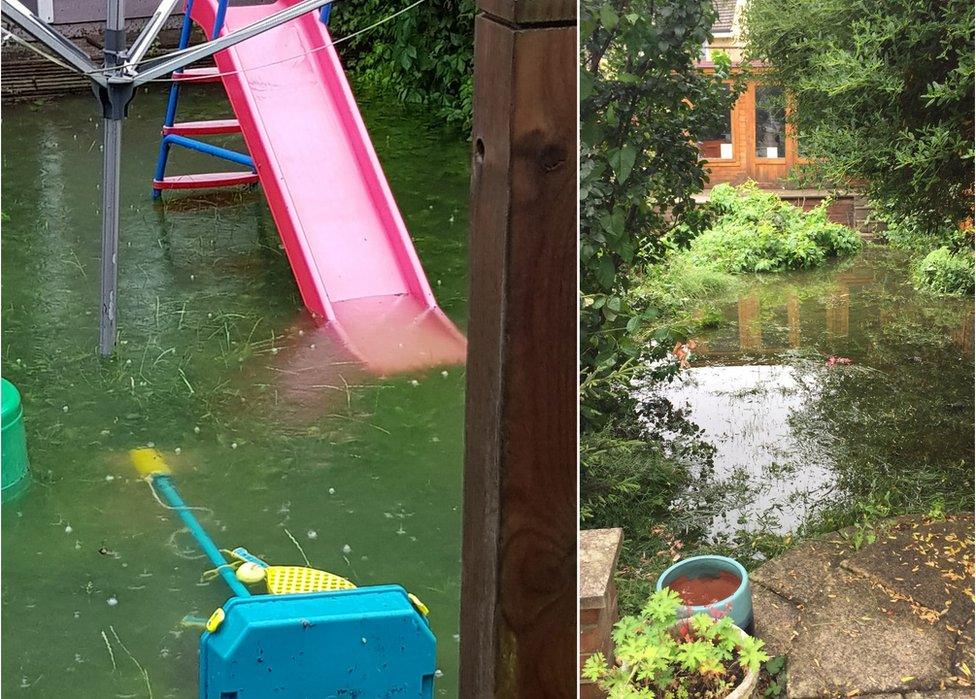
Gardens in Walthamstow remain full of floodwater
Like cities all over the world, London finds itself facing extreme weather.
Twice in the last fortnight, it has suffered flash floods with a huge amount of rain in a short period of time.
Experts say with a warming climate, extreme weather will become worse and much more common.
And it's not like London hasn't been warned. In one report, Green Party London Assembly members warned 23 stations on the London Underground Network were at significant risk of flooding as well as 643 schools.
The mayor said more is needed to be done to combat the impacts of climate change but he wants more powers and financial backing from the government.
As it stands, experts say London has to get proactive and increase its resilience against flash floods.

Residents on a street in Woodford, in east London, grabbed buckets, brooms and wooden boards to prevent rising rainwater from flooding their homes.
Resident Chris Date tweeted, external a photo of a bus in Bakers Arms, Walthamstow, saying the flood water was "above the kerb".
"It's impossible to walk on the pavement. To get on that bus the water came up to my shins. This is a canal, not a road," he said.
Mr Elliott said the flooding was the worst he had experienced in the city, and described seeing "buses stood broken down in the water".
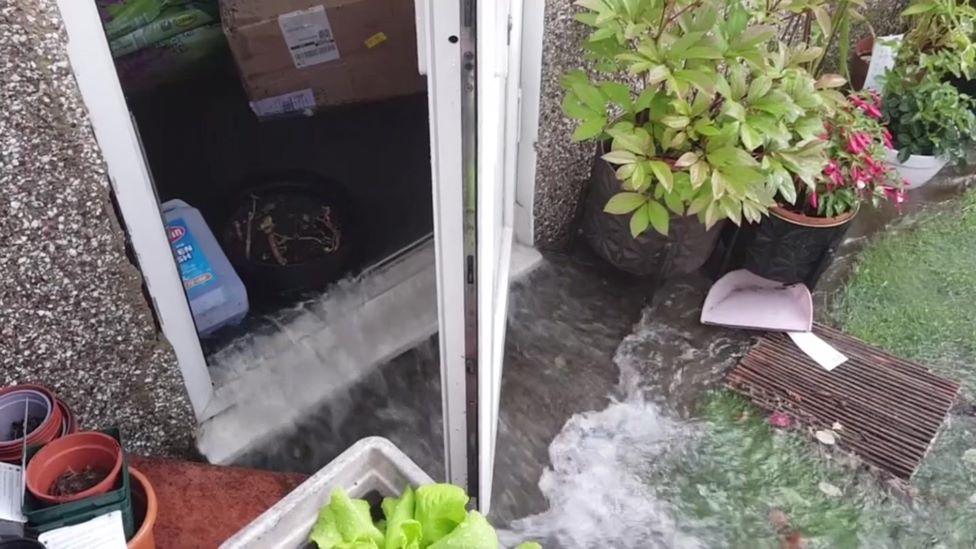
Homes in Ilford were also deluged with flood water
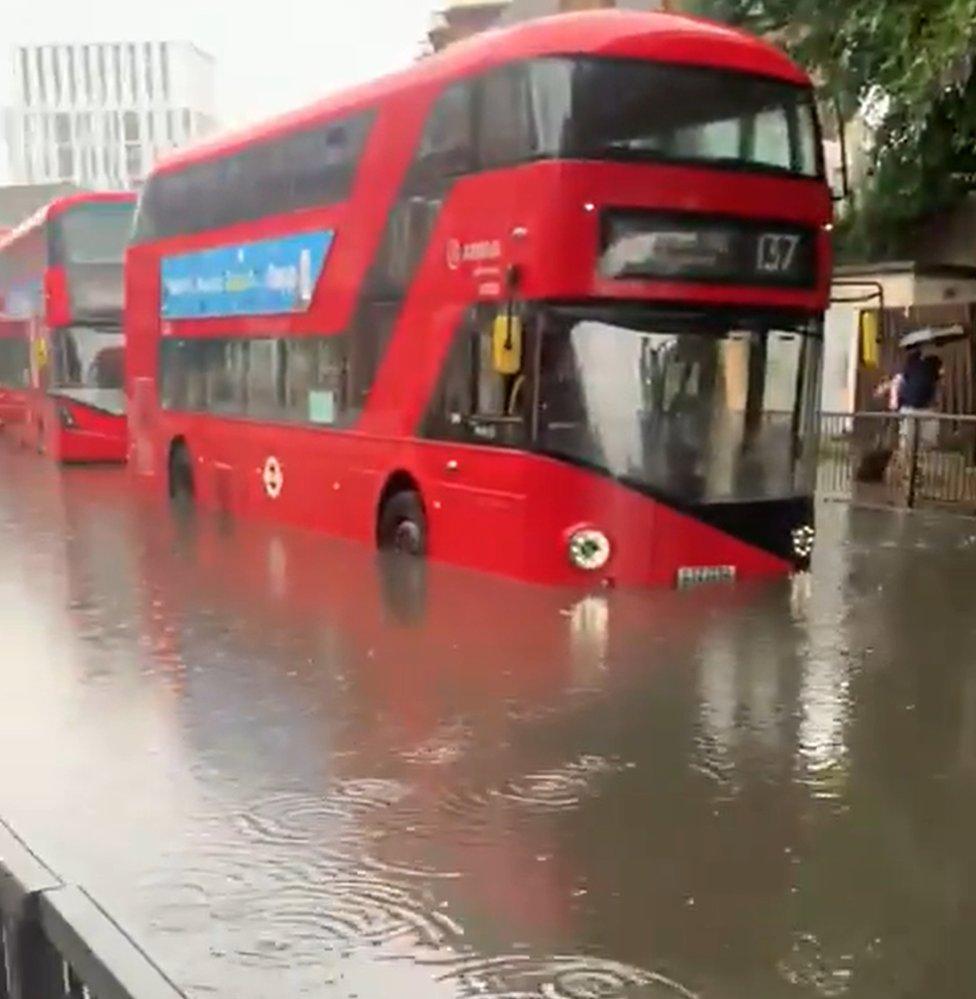
Buses were caught up in storm waters
Mayor of London Sadiq Khan said he was "in contact with key partners" with whom he will hold a roundtable.
Mr Khan said: "We are seeing increasing incidents of extreme weather events linked to climate change. This is not the first time in recent weeks that London has been hit by major flooding.
"Despite having limited powers in the area, it remains a key priority for myself and London's council leaders that more is done urgently to tackle flooding and the other impacts of climate change."
'Victorian era drainage'
Dr Veronica Edmonds-Brown, senior lecturer in aquatic ecology at the University of Hertfordshire said London's Victorian era drainage system "cannot cope with the huge increase in population".
Dr Edmonds-Brown said there were several reasons for Sunday's flooding.
"The first is building on the floodplains of the Thames and River Lea. The second is urbanisation. The more impervious surfaces we install - and we are amid a rapid housing programme at the moment - the worse this situation will get.
"The final reason is that our drainage system is not built for the amount of water it is receiving. Due to budget limitations, local authorities are not able to maintain or improve them."
The government said it would support any councils affected by flooding.
A Downing Street spokesman said: "The Environment Agency is looking at the situation closely and continues to work with local authorities to ensure that any support they need is provided."
The spokesman said Boris Johnson agreed with scientists that extreme weather was more likely as a result of global warming, but it was a matter for experts to decide whether individual events were down to the phenomenon.

PASSIONATE ABOUT THE ENVIRONMENT?: The BBC is looking for young people with original ideas and stories to tell

Related topics
- Published26 July 2021
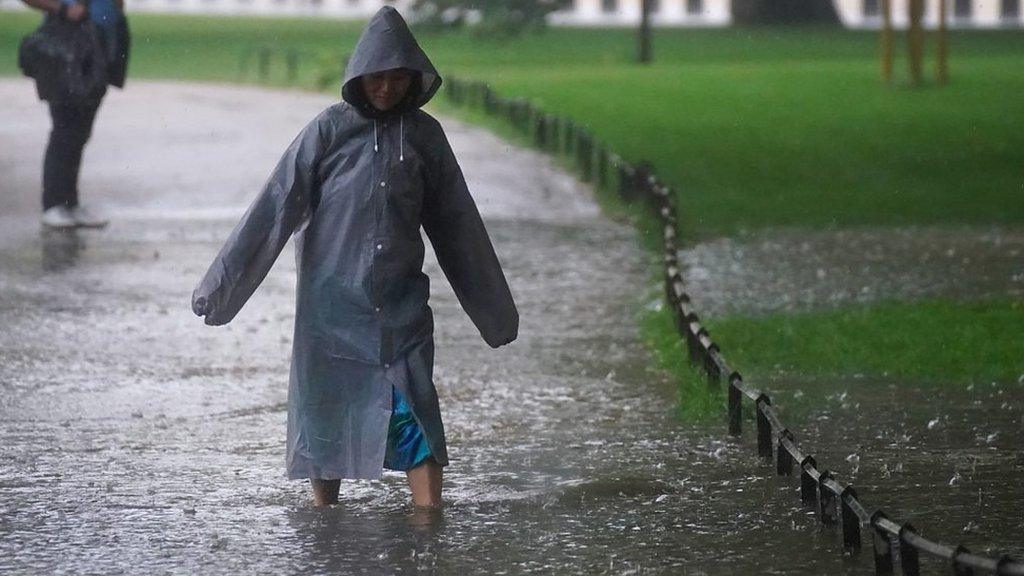
- Published26 July 2021
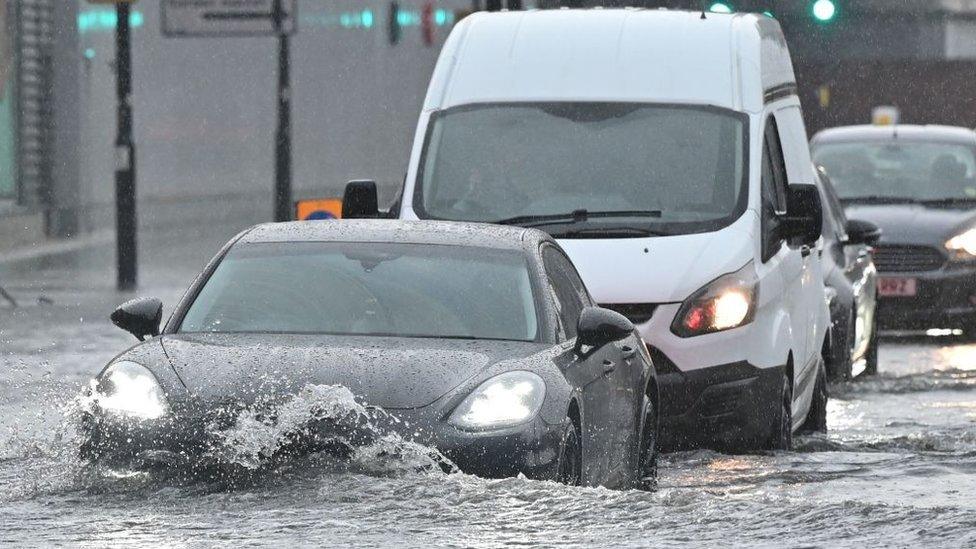
- Published25 July 2021

- Published13 July 2021
